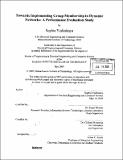Towards implementing group membership in dynamic networks : a performance evaluation study
Author(s)
Yuditskaya, Sophia
DownloadFull printable version (15.18Mb)
Other Contributors
Massachusetts Institute of Technology. Dept. of Electrical Engineering and Computer Science.
Advisor
Roger Khazan and Clifford Weinstein.
Terms of use
Metadata
Show full item recordAbstract
Support for dynamic groups is an integral part of the U.S. Department of Defense's vision of Network-Centric Operations. Group membership (GM) serves as the foundation of many group-oriented systems; its fundamental role in applications such as reliable group multicast, group key management, data replication, and distributed collaboration, makes optimization of its efficiency important. The impact of GM's performance is amplified in dynamic, failure-prone environments with intermittent connectivity and limited bandwidth, such as those that host military on the move operations. A recent theoretical result has proposed a novel GM algorithm, called Sigma, which solves the Group Membership problem within a single round of message exchange. In contrast, all other GM algorithms require more rounds in the worst case. Sigma's breakthrough design both makes and handles tradeoffs between fast agreement and possible transient disagreement, raising the question: how efficiently and accurately does Sigma perform in practice? We answer this question by implementing and studying Sigma in simulation, as well as two leading GM algorithms - Moshe and Ensemble - in a comparative performance analysis. Among the variants of Sigma that we study is Leader-Based Sigma, which we design as a more scalable alternative. (cont.) We also discuss parameters enabling Sigma's optimal practical deployment in a variety of applications and environments. Our simulations show that, consistently with theoretical results, Sigma always terminates within a single round of message exchange, faster than Moshe and Ensemble. Moreover, Sigma has less message overhead and produces virtually the same quality of views as Moshe and Ensemble, when used with a filter for limiting disagreement. These results strongly indicate that Sigma is not just a theoretical result, but indeed a result with important practical implications for Group Communication Systems: the efficiency of GM applications can be significantly improved, without compromising accuracy, by replacing current GM algorithms with Sigma.
Description
Thesis (M. Eng.)--Massachusetts Institute of Technology, Dept. of Electrical Engineering and Computer Science, 2005. Includes bibliographical references (p. 105-109).
Date issued
2005Department
Massachusetts Institute of Technology. Department of Electrical Engineering and Computer SciencePublisher
Massachusetts Institute of Technology
Keywords
Electrical Engineering and Computer Science.